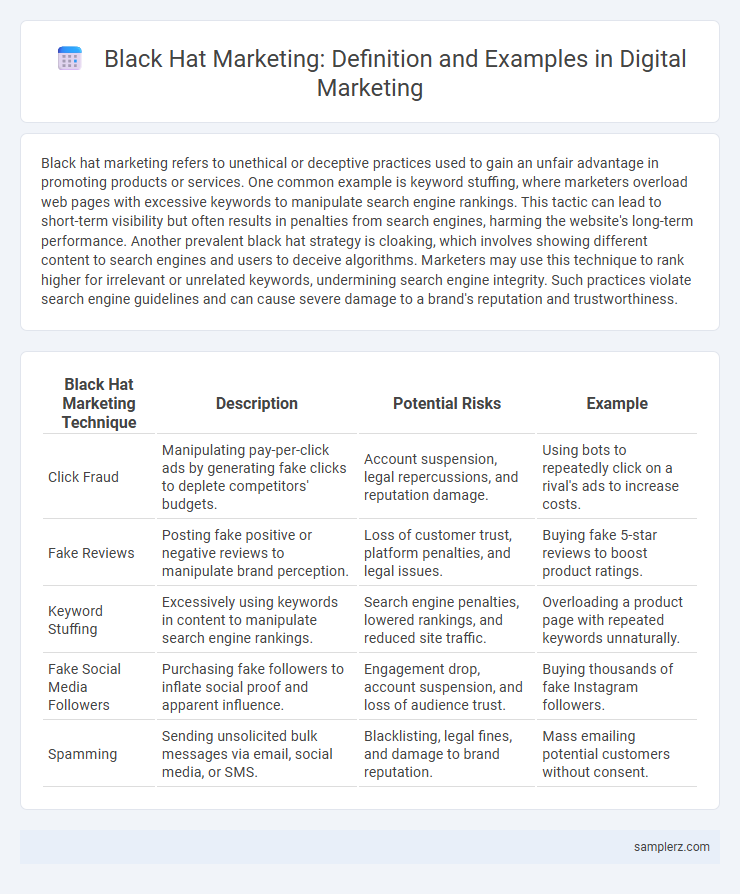Black hat marketing refers to unethical or deceptive practices used to gain an unfair advantage in promoting products or services. One common example is keyword stuffing, where marketers overload web pages with excessive keywords to manipulate search engine rankings. This tactic can lead to short-term visibility but often results in penalties from search engines, harming the website's long-term performance. Another prevalent black hat strategy is cloaking, which involves showing different content to search engines and users to deceive algorithms. Marketers may use this technique to rank higher for irrelevant or unrelated keywords, undermining search engine integrity. Such practices violate search engine guidelines and can cause severe damage to a brand's reputation and trustworthiness.
Table of Comparison
| Black Hat Marketing Technique | Description | Potential Risks | Example |
|---|---|---|---|
| Click Fraud | Manipulating pay-per-click ads by generating fake clicks to deplete competitors' budgets. | Account suspension, legal repercussions, and reputation damage. | Using bots to repeatedly click on a rival's ads to increase costs. |
| Fake Reviews | Posting fake positive or negative reviews to manipulate brand perception. | Loss of customer trust, platform penalties, and legal issues. | Buying fake 5-star reviews to boost product ratings. |
| Keyword Stuffing | Excessively using keywords in content to manipulate search engine rankings. | Search engine penalties, lowered rankings, and reduced site traffic. | Overloading a product page with repeated keywords unnaturally. |
| Fake Social Media Followers | Purchasing fake followers to inflate social proof and apparent influence. | Engagement drop, account suspension, and loss of audience trust. | Buying thousands of fake Instagram followers. |
| Spamming | Sending unsolicited bulk messages via email, social media, or SMS. | Blacklisting, legal fines, and damage to brand reputation. | Mass emailing potential customers without consent. |
Understanding Black Hat Marketing Techniques
Black Hat Marketing techniques exploit unethical strategies such as cloaking, keyword stuffing, and misleading ad copy to manipulate search engine rankings and deceive consumers. These practices prioritize short-term gains but pose significant risks, including penalties from platforms like Google and long-term damage to brand reputation. Recognizing tactics like fake reviews, spammy backlinks, and hidden text is essential for safeguarding marketing integrity and fostering sustainable growth.
Common Examples of Black Hat Marketing
Common examples of black hat marketing include keyword stuffing, cloaking, and using private link networks to manipulate search engine rankings. These unethical tactics deceive algorithms and users, often resulting in penalties or bans from search engines like Google. Such practices undermine brand credibility and violate digital marketing guidelines, making long-term success unsustainable.
Cloaking and Deceptive Redirects in Marketing
Cloaking in marketing involves presenting different content to search engines and users, manipulating rankings to drive traffic under false pretenses. Deceptive redirects send users to unintended websites, often unrelated to the advertized content, eroding trust and violating search engine guidelines. Both techniques risk severe penalties, including search engine bans and damage to brand reputation.
Keyword Stuffing: Manipulating Search Rankings
Keyword stuffing in marketing involves excessively loading web content with target keywords to manipulate search engine rankings, often resulting in poor user experience and search engine penalties. This black hat SEO technique exploits algorithms by repeating phrases unnaturally across meta tags, headers, and body text, aiming to artificially boost visibility. Search engines like Google now deploy sophisticated filters to detect and penalize keyword stuffing, emphasizing the importance of organic, relevant content for sustainable marketing success.
Fake Reviews and Testimonial Schemes
Fake reviews and testimonial schemes manipulate consumer trust by presenting fabricated or incentivized feedback as genuine endorsements. These black hat marketing tactics distort brand reputation and mislead potential customers, resulting in unethical competitive advantages. Search engines and platforms increasingly penalize businesses engaged in such deceptive practices, impacting online visibility and credibility.
Click Fraud in Online Advertising
Click fraud in online advertising manipulates pay-per-click (PPC) campaigns by generating fake clicks on ads to drain competitors' budgets or inflate earnings. Bots, hired click farms, and automated scripts often execute these deceptive practices, leading to wasted ad spend and skewed performance metrics. Search engines and advertising platforms continuously develop sophisticated algorithms to detect and prevent click fraud, safeguarding campaign integrity and advertiser investments.
Misleading Advertising Practices
Misleading advertising practices in black hat marketing involve deliberately providing false or exaggerated claims to deceive consumers, such as fake reviews or hidden fees that distort product value. These tactics exploit consumer trust, leading to damaged brand reputation and potential legal consequences under consumer protection laws. Companies engaging in such practices risk penalties and loss of customer loyalty due to unethical marketing strategies.
Using Spam and Unsolicited Emails
Using spam and unsolicited emails in marketing involves sending bulk messages to large lists of recipients without their consent, often leading to negative brand perception and legal penalties under regulations like the CAN-SPAM Act. This black hat tactic manipulates email filters and exploits mailing lists, reducing engagement rates and potentially damaging sender reputation. Marketers relying on these methods risk blacklisting by email service providers, which can severely impact legitimate communication efforts.
Manipulation Through Social Media Bots
Social media bots manipulate marketing outcomes by artificially inflating engagement metrics such as likes, shares, and comments, creating a misleading perception of popularity and influencing consumer behavior. These bots can distort brand reputation, skew analytics, and undermine genuine interactions, leading to reduced trust and potential penalties from platforms like Facebook or Instagram. Marketing campaigns relying on bot-driven manipulation risk legal repercussions and long-term damage to brand integrity.
Legal and Ethical Risks of Black Hat Marketing
Black hat marketing techniques such as spamming, cloaking, and keyword stuffing often violate search engine guidelines and consumer protection laws, risking legal penalties and loss of credibility. These unethical practices can lead to lawsuits, fines, and permanent blacklisting by platforms like Google, severely damaging brand reputation. Ignoring ethical standards undermines long-term customer trust and may cause irreversible harm to a company's market position.

example of black hat in marketing Infographic
 samplerz.com
samplerz.com